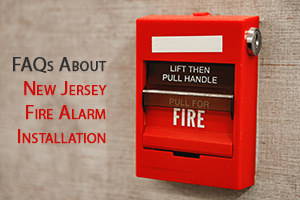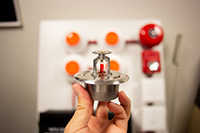Fire alarm installation is a crucial aspect of protecting your New Jersey property, ensuring safety for occupants and compliance with local regulations. Whether you own a business, manage a school, or oversee a commercial building, having a reliable fire alarm system in place is not just a legal requirement but also a lifesaving necessity. Yet, many property owners have questions about the process, such as what type of system to choose, how much it costs, and how often maintenance is required. This guide answers the most frequently asked questions about fire alarm installation in New Jersey, providing clarity on everything from system features to state fire code compliance. With advancements in fire safety technology and evolving regulations, staying informed is more important than ever. Let’s explore the essentials to ensure your property is equipped with the best possible protection.
Top 10 FAQs About Fire Alarm Installation in New Jersey

1. What are the benefits of installing a fire alarm system?
Installing a fire alarm system is essential for safeguarding lives and property. It provides early detection of fire hazards, giving occupants time to evacuate and reducing potential damage. Additionally, having a compliant system is a legal requirement for many New Jersey properties, ensuring adherence to state and local fire codes.
2. What types of fire alarm systems are available?
Fire alarm systems come in various types, including conventional, addressable, and wireless systems. Conventional systems are cost-effective for smaller properties, while addressable systems offer precise detection for larger facilities. Wireless systems provide flexibility in installation, especially in buildings where wiring is challenging.
3. How much does fire alarm installation cost in New Jersey?
The cost varies depending on the size of the property, the type of system, and any additional features such as mass notification or remote monitoring. On average, commercial installations range from $2,500 to $10,000 or more. A professional assessment is essential for an accurate estimate.
4. What is the process for installing a fire alarm system?
The installation process typically involves a site assessment to determine the system’s requirements, designing a layout that complies with New Jersey fire codes, installing the equipment, and testing the system for functionality. Working with a licensed professional ensures the process is efficient and compliant.
5. How often should fire alarm systems be maintained?
Routine maintenance is critical for keeping your system operational. New Jersey regulations generally require systems to be inspected and tested annually by a certified technician. Regular maintenance helps identify issues early and ensures the system works during an emergency.
6. Are there specific fire codes in New Jersey for alarm installation?
Yes, New Jersey has strict fire safety codes based on the International Fire Code (IFC) and the National Fire Protection Association (NFPA) standards. These codes dictate system design, placement of devices, and maintenance schedules. A licensed installer will ensure your system meets all requirements.
7. Can fire alarms integrate with other safety systems?
Modern fire alarm systems can integrate with other safety and security systems, such as sprinklers, access control, and mass notification systems. This integration enhances overall safety and simplifies monitoring through centralized control.
8. When should you upgrade your fire alarm system?
If your system is over 10 years old, experiences frequent false alarms, or lacks modern features such as remote monitoring, it’s time to consider an upgrade. Staying compliant with updated codes and leveraging new technology ensures better safety and reliability.
9. How can I choose the right fire alarm installer in New Jersey?
Look for a licensed professional with experience in commercial installations. Check for certifications, customer reviews, and familiarity with New Jersey fire codes. A reliable installer will provide a detailed proposal and ongoing support.
10. What should I do after installation?
Once your system is installed, make sure you receive training on how to operate and monitor it. Schedule regular maintenance and inspections to keep the system compliant and operational. Additionally, ensure all building occupants are familiar with evacuation procedures.
By addressing these common questions, you can make informed decisions about fire alarm installation in New Jersey, ensuring your property is safe, compliant, and prepared for any emergency.
Invest in High-Quality New Jersey Fire Alarm Installation Today

Ensuring your property is equipped with a reliable fire alarm system is a critical step in protecting lives, assets, and peace of mind. From understanding the different types of systems to complying with New Jersey’s strict fire codes, every detail matters when it comes to fire alarm installation. Working with a licensed professional ensures compliance and long-term functionality of your system through proper installation and regular maintenance. Whether you’re upgrading an outdated system or installing one for the first time, investing in high-quality New Jersey fire alarm installation is a decision that pays off in safety and security. Don’t leave your property’s fire protection to chance—partner with an experienced installer to ensure your system meets all regulatory requirements and provides the protection your building needs. Take the next step today and safeguard your New Jersey property with a state-of-the-art fire alarm system.
